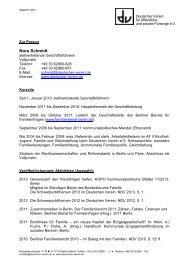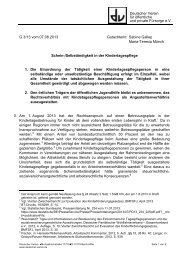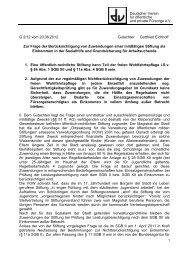Workshop 1.6 - Deutscher Verein für öffentliche und private Fürsorge
Workshop 1.6 - Deutscher Verein für öffentliche und private Fürsorge
Workshop 1.6 - Deutscher Verein für öffentliche und private Fürsorge
Erfolgreiche ePaper selbst erstellen
Machen Sie aus Ihren PDF Publikationen ein blätterbares Flipbook mit unserer einzigartigen Google optimierten e-Paper Software.
3) Improved information for service managers:<br />
The use of IT could also open a new world for managers in terms of getting a much more transparent agency. More extensive use of IT<br />
can be an important tool for monitoring and ensuring quality at all stages of service-delivery.<br />
4) A more practice- and knowledgebased research in social services:<br />
Information technology allows much more research on what is often called „the black box“ i.e. research that is focusing on what goes<br />
on in the user-case work interaction. This might possibly lead to better answers to what are good interventions and which interventions<br />
people lead to a better life.<br />
3. The case of Norway<br />
Even if the number of personal computers per capita in Norway is among the highest in Europe this does not reflect the way social<br />
services are delivered. Even if most social service authorities have installed information technology mechanisms that allow greater<br />
access to services for users and improved exchange of information, very few local services have gone so far to communicate with the<br />
clients through Internet. Business is done more or less in the traditional way with restricted opening hours, where the user has to come<br />
to the office, wait in line, ask for an appointment, fill out a form, hand it in and wait for some weeks to get an answer or get an<br />
appointment<br />
There are however signs indicating that some major changes will happen soon with consequences for the way social services will be<br />
delivered in the future. In the autumn of 2001 the parliament asked the government to consider a stronger coordination of the three main<br />
public services and to consider integrating them into one single frontline organisation. The present system has been heavily criticised<br />
for being fragmented and inaccessible. On May 13 the Norwegian Parliamentary Assembly will discuss a white paper prepared by the<br />
Norwegian government proposing a merger between the municipal social assistance services, public employment services and social<br />
security offices into new and united front-line service on the local level. In case there is a majority in favour of this major public service<br />
reform it will have huge implications on a number of levels. A major element of the reform will be to enhance client participation and<br />
effectiveness at all stages of service delivery through the use of computerbased information technology from improved access to all<br />
kinds of information, filling out of forms, case processing and dialogue and feedback to and from clients This development must not<br />
replace the professional one-to-one contact with the case manager, but has to be implemented as tools that adds value to the dialogue<br />
between the user and the social worker .<br />
In a few municipalities we have started some pilot projects aiming at testing a new internet based system called Q-linx in a few pilot<br />
projects. This system looks quite promising. It has been developed in Philadelphia, USA, in close cooperation with practitioners and<br />
researchers and has been tested out in Germany, Japan, Canada, as well as in the US.<br />
4. Concluding comments and future steps<br />
Social services systems across Europe face many challenges. One of the main challenges are at least in Norway related to the role of<br />
users in social services and their possibilities for participation. Information technology could prove to become an important additional<br />
tool for an improved dialogue with users in danger of being socially excluded.<br />
Nevertheless, the jobs ahead of us are immense and in order to succeed we might need some building blocks, that future development<br />
has to rest on:<br />
• User participation as a central value of social work has to be restored in social services, such a process must include both the pitfalls<br />
and advantages of information technology.<br />
• Introducing IT must ease the bureaucratic burden of social workers. Information technology must allow more time for direct dialogue<br />
and contact with the user.<br />
• Access to IT must also include vulnerable groups and individuals. We have to provide access where ever you live. Whether it is on<br />
the streets, in jail or at home.<br />
• Exchange of experience, innovation and research are needed.<br />
Zurück zum Inhalt<br />
349

















